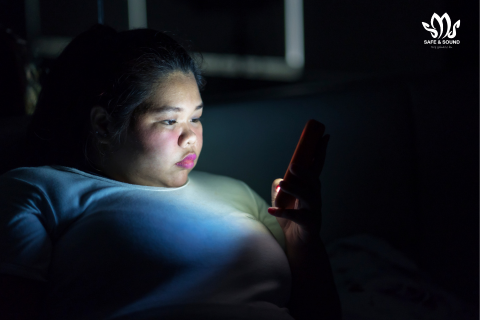Habits Psychologists Recommend You Quit If You’re Struggling with Insomnia | Safe and Sound
Are you tossing and turning at night, unable to sleep? Perhaps, some seemingly harmless habits are secretly disrupting your sleep. Let's listen to the advice of psychologists and mental health experts to know what things you should "stop doing" if you want to end insomnia at night, reduce fatigue, stress and improve your emotions.
Ngo Thi Sang | Master of Educational Psychology – Applied mental health care Safe and Sound
Institute of Medical Technology Applications
1. Sleepless nights are not just a story of sleep
Insomnia is an increasingly common condition in modern society where people are constantly overwhelmed by work pressure, complicated relationships and a constantly “racing” pace of life. Many people think that insomnia is simply difficulty closing their eyes at night. However, according to psychologists, this is actually a symptom that reflects an imbalance in psychology, emotions and lifestyle.
Prolonged stress, simmering anxiety, and unresolved pent-up emotions are the leading psychological factors that prevent the brain from relaxing. Meanwhile, living habits such as working late, eating dinner too late, using electronic devices before bed, etc. silently disrupt the biological rhythm that requires regularity for the brain to know when to rest.
The underlying causes of insomnia at night often include:
- Psychological and emotional disorders such as anxiety, depression, acute or chronic stress keep the mind in a state of high alert.

Insomnia at night can come from psychological disorders.
- Circadian rhythm disorders caused by staying up late for long periods, working night shifts or jet lag cause the body to lose its ability to secrete melatonin at the right time.
- Negative thinking habits before bed: such as worrying about the future, bad situations, blaming yourself. They stimulate the brain area responsible for processing threats and negative emotions.
- Pressures and disruptions from daily life: personal conflicts, job loss, divorce, exams or emotional upheavals that have not been fully processed can all flare up at night, when the mind is quiet and facing itself.
Not only does it cause "difficulty sleeping", prolonged insomnia leads to a negative spiral: The more you lose sleep ➝ the more tired you are - irritability - difficulty concentrating - memory loss - loss of energy - reduced work performance ➝ that continues to make you more stressed and you continue to lose sleep at night.
More dangerously, prolonged insomnia also weakens the immune system, disrupts the endocrine system, increases the risk of cardiovascular disease, high blood pressure and diabetes. For mental health, poor sleep can easily cause negative emotions to prevail, even leading to anxiety disorders or depression if not intervened promptly.
2. Habits you should give up if you want to sleep better, according to advice from a psychologist
1. Thinking too much before going to bed
Do you often lie in bed, but your mind is "running to meet deadlines", replaying conversations from the day, or imagining bad things that could happen?
This is a sign of nighttime overthinking, a common cause of the brain not being able to shut off, even when the body is exhausted. This activates the prefrontal cortex, which handles reasoning and decision-making, and the sympathetic nervous system, making you increasingly tense and alert.
Advice from a psychologist:
- Establish a pre-bedtime "thought break" ritual by repeating positive affirmations such as: "Now is the time for rest. Everything else will be taken care of tomorrow."
- Keep a stress-relief journal: Spend 5–10 minutes before bed writing down any worries, to-dos, or feelings from the day. This will help “get” your worries out on paper so your mind has room for sleep.
2. Scrolling through your phone, watching TikTok videos, reading the news right before bedtime

Surfing the phone and reading news close to bedtime is one of the causes of insomnia.
You think a little internet surfing to relax your mind before bed is harmless? In fact, the blue light from your phone and emotionally stimulating content are the number one sleep thief today.
Blue light inhibits melatonin, a hormone that helps regulate biological rhythms and induce sleepiness. In addition, the brain is "loaded" with too many images, information, and social comparisons from social networks, causing psychological and emotional disorders, anxiety, and difficulty relaxing.
Recommendations for you:
- Turn off electronics at least 30–60 minutes before bed. If you frequently check your phone when you feel sleepy, keep it out of the bedroom.
- Instead, try a “relaxing nighttime routine”: read a physical book, write in a journal, listen to soft music, or practice simple meditation to help your brain transition into a restful state.
See more: 5 ways to help you sleep well when you have insomnia due to stress
3. Bring stress to bed
Bed is not the place to deal with the stresses of the day. But psychologists say many people have a habit of planning, internally debating, or blaming themselves right before closing their eyes, which puts the mind on edge and creates a negative association between sleep and stress.
Advice from a psychologist:
- Set a mental boundary: make a pact with yourself that “whatever you don’t finish will wait until tomorrow morning.” Write a short “to do tomorrow” list and… leave it there.
- Practice 4-7-8 deep breathing (inhale for 4 seconds, hold for 7 seconds, exhale for 8 seconds) or the body scan technique: direct your attention from head to toe to truly relax your body, interrupt your train of thought and slow your heart rate.

4. Lying in bed for too long
When you lie awake for a long time, you feel more psychological pressure to sleep, which in turn activates the stress response, making you… even more unable to sleep. The bed gradually becomes a “pressure cage” instead of a place to relax.
Advice from psychologists:
- If you still can't fall asleep after 20–30 minutes, get out of bed. Do a light, non-stimulating activity like walking slowly, folding laundry, drinking warm water, or listening to soothing music.
- Only go back to bed when you feel sleepy. Doing this regularly helps your brain associate bed with relaxation and sleepiness, not stress.
5. Drinking coffee, strong tea or using stimulants after 3pm

Drink coffee, strong tea or stimulants after 3pm
Even though you may feel like “coffee doesn’t affect me much,” caffeine can actually stay in your bloodstream for 6–10 hours, causing increased heart rate, mild euphoria, and a delay in your natural sleep cycle.
Additionally, people with psychological issues such as stress and anxiety are more sensitive to caffeine. You may not realize that you are unusually alert or easily “startled” at night, but that late afternoon cup of tea or coffee while running a deadline could be the cause.
Instead of consuming caffeine after 3 p.m., you should:
- Drinking caffeine-free herbal teas such as chamomile tea, peppermint tea, lotus heart tea helps calm the nervous system and soothe emotions.
- Drink warm water or warm milk to help settle the stomach and give the body a sense of security.
6. Sleeping too much during the day
When you don’t get enough sleep at night, you may feel exhausted during the day and want to “catch up on sleep.” But this disrupts your nighttime sleep cycle, leaving you awake that night and again sleep deprived, a never-ending cycle.
Psychologists advise:
- If needed, take a short nap of 15–30 minutes, before 3 p.m. to “recharge” your body without affecting your nighttime sleep.
- Increase exposure to morning light: Open the curtains to let in the sunlight, walk for 10-15 minutes in the early morning to help “reset” the biological clock and help the body distinguish between day and night.
Safe and Sound Clinic - Family health and psychological support
With a team of experienced doctors and specialists, Safe and Sound Clinic is a pioneer in comprehensive health care with health care services from medicine to psychology.
“Early prevention - Timely support - Long-term companionship”.
If you have any doubts or experience any physical or mental health problems, please contact HOTLINE 0964 778 911 (Phone/Zalo, 24/7) for answers and support as soon as possible!
HOW TO MAKE AN APPOINTMENT for online or in-person consultation with an expert
- At SnS Clinic - IMT Institute
- Or download and schedule a consultation on the Safe and Sound app to manage and track your schedule anytime, anywhere.
Safe and Sound (SnS) - Institute of Applied Medical Technology (IMT)
See also:




